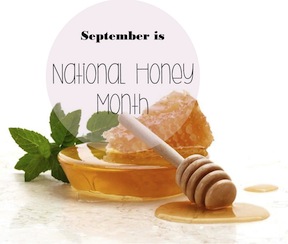from Bettina
Happy National Honey Month!
It’s often said that without honey our civilization would grind to a screeching halt. While that scenario is probably a ways off, let’s take a moment to think about what might happen if we didn’t have honeybees.
According to the National Honey Board, without honeybees, there’d be absolutely no almonds, because the production of almonds depend 100% on honeybee pollination. That means we would need to find something else to top our salads with, or to snack on. Apples, avocados, blueberries, cherries, cranberries, and sunflowers are about 90% dependent on honeybees, as well. Not to mention, most of the fruits and vegetables we eat are pollinated by bees, too. This means that almost all of our fruits and vegetables would possibly disappear. I can’t imagine even a day without fruits or vegetables….
So enough of the doom and gloom! Here are some fun honey facts from the National Honey Board:
- To make a pound of honey, the 60,000 or so honeybees in a hive need to visit at least 2 million flowers
- The bee’s nectar source (the blossoms) determine the color and flavor of the honey. In the US alone there are more than 300 kinds of honey
- Honey is a humectant, which means it attracts and retains moisture. Which is why honey is used in a variety of moisturizing products including cleansers, creams, shampoos and conditioners
- In the past, honey was the primary sweetener used in cooking and baking. When refined sugar made from sugar cane came along, it provided a more inexpensive alternative form of sweetening and replaced honey for most cooking purposes
- Honey is one of the purest foods on the planet. A bottle of pure honey contains nothing but a sweet substance produced by honey bees from the nectar of plants. Nothing is added to or taken out of honey to make it sweet
- Honey never goes bad! It was reported that archaeologists found 2000 year old jars of honey in Egyptian tombs and they still tasted great!
- Historically honey was often used as a dressing for wounds and a first aid treatment for burns and cuts because of its antiseptic properties
- Although not conclusive, it’s been suggested that including local honey in your diet may help alleviate allergies for some. The honey would need to have been harvested from within 50 miles of where you live for the best outcome
Of course as with all things, not all honey is created equal. Or, more accurately, not all honey on the grocery store shelves is equal. Sometimes the honey you can find in the store has been treated, which takes away all of its wonderful natural properties. If you can, buy from your local farmer, farmer’s market, or a reputable local company that you can trust.
Our local resource around here is Honey Comb Heroes in Stafford. You can find them at almost all the area farmers markets, or you can even buy directly from their website or farm.

